Koninklijke Ahold Delhaize Bundle
Who Really Owns Koninklijke Ahold Delhaize?
Unraveling the ownership structure of Koninklijke Ahold Delhaize is key to understanding its strategic moves and market position. This global food retail giant, born from the 2016 merger of Ahold and Delhaize Group, operates across continents. Discover how this complex ownership web influences everything from Koninklijke Ahold Delhaize SWOT Analysis to its future direction.
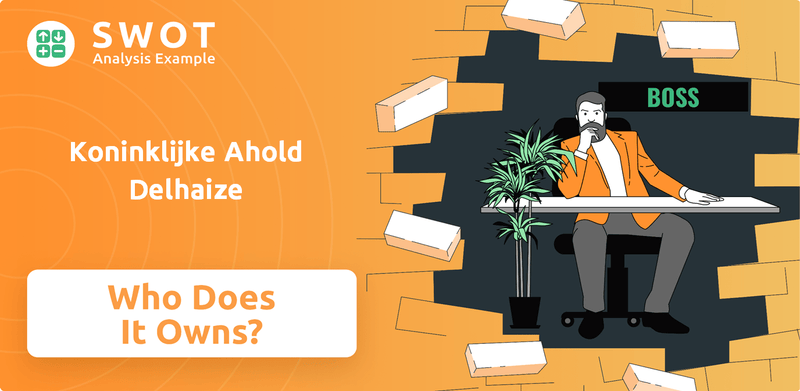
From its roots in 1887 with Albert Heijn and the Delhaize brothers, Ahold Delhaize's evolution reflects the changing dynamics of the retail landscape. Knowing who the major Ahold Delhaize shareholders are offers insights into the company's governance and long-term goals. This exploration will reveal the key players behind Ahold Delhaize, examining the influence of institutional investors and the impact on Ahold Delhaize stock.
Who Founded Koninklijke Ahold Delhaize?
The current structure of Koninklijke Ahold Delhaize stems from the 2016 merger of Royal Ahold and Delhaize Group, two major players in the European retail sector. Royal Ahold's origins can be traced back to 1887, when Albert Heijn established a small grocery store in the Netherlands. This marked the beginning of a business that would evolve significantly over time, with its early ownership rooted within the Heijn family.
Similarly, the Delhaize Group was founded in 1867 in Belgium by the Delhaize brothers, Jules, Edouard, and Auguste. They initially started a wholesale food business that quickly transitioned into a retail chain. The Delhaize family held the initial ownership, guiding the company's growth and expansion, much like the Heijn family did with Ahold. Both companies eventually diversified their ownership as they expanded and sought external capital.
Early ownership structures for both Royal Ahold and Delhaize Group were primarily concentrated within the founding families. These families maintained control and influence as the businesses grew. As both companies expanded, they eventually became publicly traded entities, leading to a broader distribution of Ahold Delhaize shareholders.
Albert Heijn opened a grocery store in Oostzaan, Netherlands, in 1887, which laid the foundation for Royal Ahold.
The Delhaize Group was established in 1867 in Belgium by the Delhaize brothers.
Both Ahold and Delhaize Group initially had ownership concentrated within their founding families.
Both companies eventually became publicly traded, which diversified the Ahold Delhaize ownership structure.
Early agreements would have focused on family succession and business continuity rather than complex vesting schedules.
The merger of Royal Ahold and Delhaize Group created the current Koninklijke Ahold Delhaize.
The early stages of both companies involved family-centric ownership, which gradually evolved as they expanded and sought external investment. This shift is a common trend in the history of many large corporations. For more insights, you can read more about the history of Ahold Delhaize.
Understanding the early ownership structures of Royal Ahold and Delhaize Group provides context for the current Ahold Delhaize structure.
- Initial ownership was primarily within the founding families.
- Both companies expanded and eventually became publicly traded.
- The 2016 merger created the current Ahold Delhaize.
- Ahold Delhaize stock ownership is now widely distributed.
- Early agreements focused on family succession and business continuity.
Koninklijke Ahold Delhaize SWOT Analysis
- Complete SWOT Breakdown
- Fully Customizable
- Editable in Excel & Word
- Professional Formatting
- Investor-Ready Format
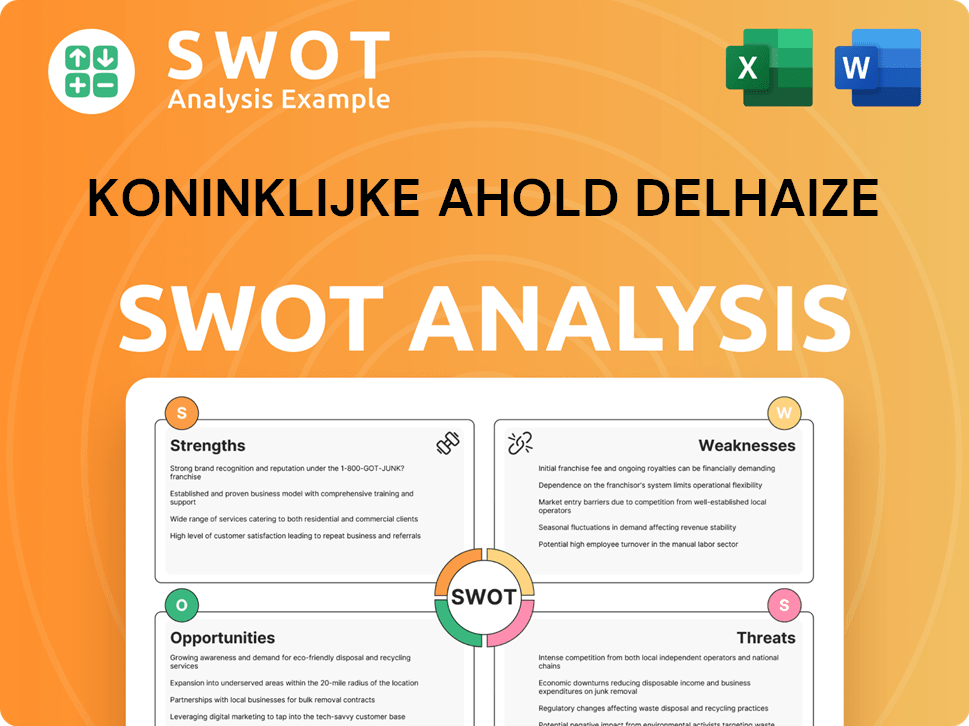
How Has Koninklijke Ahold Delhaize’s Ownership Changed Over Time?
The ownership structure of Koninklijke Ahold Delhaize, a company with a rich history, has been significantly shaped by key events. Before the 2016 merger, both Royal Ahold and Delhaize Group operated independently as publicly traded entities. The merger, a stock-for-stock transaction, marked a pivotal moment, with Ahold shareholders initially holding approximately 61% and Delhaize Group shareholders holding around 39% of the combined entity. This strategic move consolidated two major players in the grocery retail sector, creating a stronger market presence and impacting the Ahold Delhaize ownership landscape.
Koninklijke Ahold Delhaize's journey reflects a transition from a structure with diverse shareholders to one largely dominated by institutional investors. The company's listing on Euronext Amsterdam and its inclusion in the AEX index, along with its American Depositary Receipts (ADRs) trading over-the-counter in the United States, have attracted substantial institutional investment. This shift underscores the company's maturity and its appeal to both passive and active investment funds. Understanding the target market of Koninklijke Ahold Delhaize is crucial to understanding the company's financial performance and the interests of its shareholders.
| Key Event | Impact on Ownership | Year |
|---|---|---|
| Merger of Royal Ahold and Delhaize Group | Creation of Koninklijke Ahold Delhaize; Ahold shareholders held ~61%, Delhaize Group shareholders held ~39% | 2016 |
| Listing on Euronext Amsterdam and Inclusion in AEX Index | Increased institutional investment; attracted passive and active funds | Ongoing |
| ADR Trading in the US | Enhanced accessibility for US investors, contributing to a broader shareholder base | Ongoing |
As of early 2025, the major shareholders of Ahold Delhaize are primarily institutional investors. Firms like BlackRock, Inc. and The Vanguard Group consistently hold significant stakes. These institutional investors collectively manage a substantial portion of the company's outstanding shares, influencing corporate governance through their voting power. While specific ownership percentages fluctuate with market dynamics, the trend indicates a strong presence of institutional investors, reflecting the company's status as a mature, publicly traded entity. Individual insider ownership, including shares held by the executive and supervisory boards, represents a smaller percentage of the total shares.
Koninklijke Ahold Delhaize is primarily owned by institutional investors, with BlackRock and The Vanguard Group among the top holders.
- The 2016 merger was a stock-for-stock transaction.
- Ahold Delhaize is listed on Euronext Amsterdam.
- Institutional investors hold a substantial portion of the shares.
- Individual insider ownership is a smaller percentage.
Koninklijke Ahold Delhaize PESTLE Analysis
- Covers All 6 PESTLE Categories
- No Research Needed – Save Hours of Work
- Built by Experts, Trusted by Consultants
- Instant Download, Ready to Use
- 100% Editable, Fully Customizable
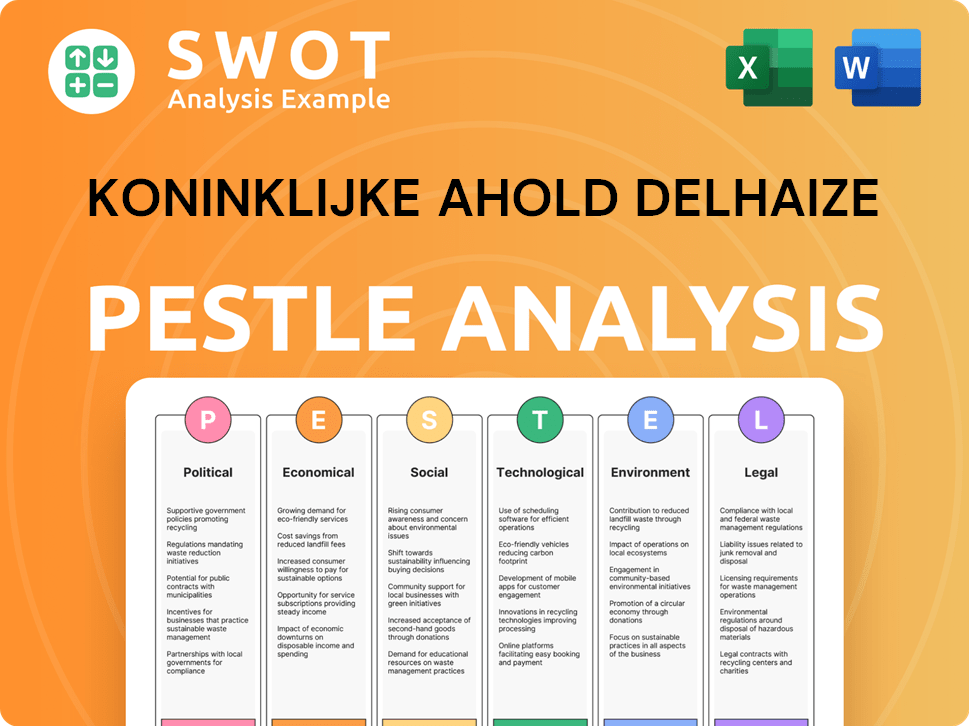
Who Sits on Koninklijke Ahold Delhaize’s Board?
Koninklijke Ahold Delhaize operates under a two-tier board structure, common in Dutch companies. This setup includes an Executive Board, responsible for day-to-day management, and a Supervisory Board, which oversees the Executive Board and the company's overall direction. As of early 2025, the boards consist of executives, industry experts, and independent members, ensuring a range of perspectives in decision-making.
The Supervisory Board, for example, includes members with expertise in retail, finance, and international business. Board members generally do not represent specific major shareholders; instead, they act in the best interests of the company and all stakeholders. The company emphasizes strong corporate governance and regularly engages with its shareholders. For more insights, you can read about the Marketing Strategy of Koninklijke Ahold Delhaize.
| Board Role | Description | Responsibilities |
|---|---|---|
| Executive Board | Manages the day-to-day operations of Ahold Delhaize | Implementing strategy, overseeing financial performance, and managing the company's various brands. |
| Supervisory Board | Oversees the Executive Board and the overall direction of the company. | Appointing and supervising the Executive Board, setting strategic direction, and ensuring corporate governance. |
| Board Members | Composed of a mix of executives, industry experts, and independent members. | Bringing diverse expertise in retail, finance, and international business. |
The voting structure of Koninklijke Ahold Delhaize is based on a one-share-one-vote principle for its ordinary shares. This means each share has equal voting rights, promoting equitable distribution of voting power among Ahold Delhaize shareholders. There are no known dual-class shares or special voting rights. The company has a market capitalization of approximately $24.5 billion as of March 2024. Ahold Delhaize's emphasis on robust corporate governance and regular shareholder engagement underscores its commitment to transparency and accountability.
Koninklijke Ahold Delhaize's governance structure ensures accountability and transparency.
- Two-tier board structure with Executive and Supervisory Boards.
- One-share-one-vote voting principle.
- Emphasis on shareholder engagement and robust corporate governance.
- Independent board members representing diverse expertise.
Koninklijke Ahold Delhaize Business Model Canvas
- Complete 9-Block Business Model Canvas
- Effortlessly Communicate Your Business Strategy
- Investor-Ready BMC Format
- 100% Editable and Customizable
- Clear and Structured Layout
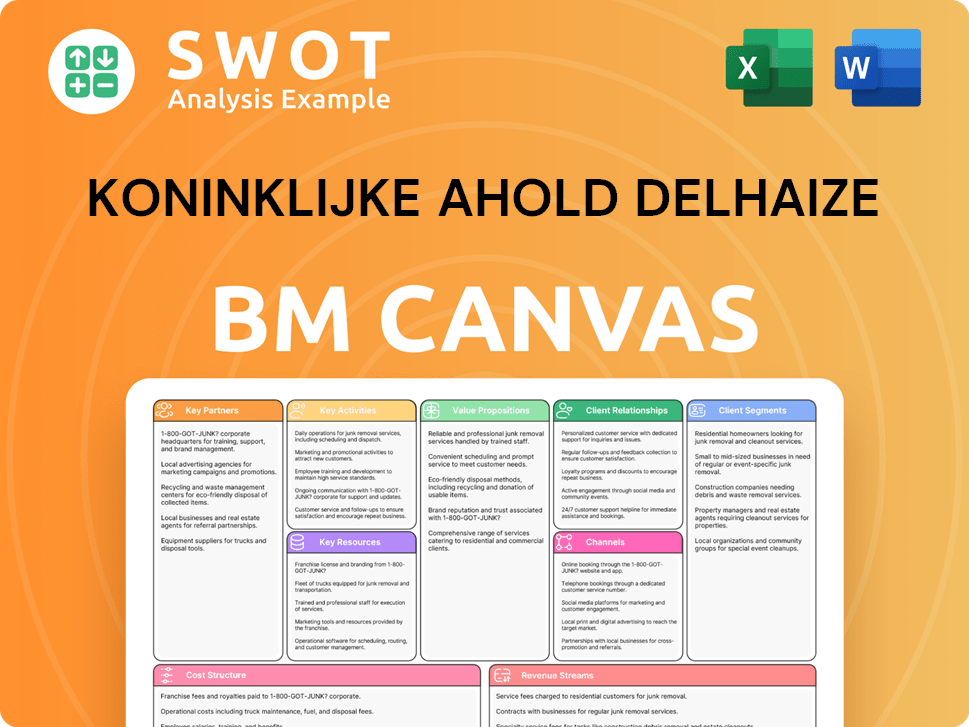
What Recent Changes Have Shaped Koninklijke Ahold Delhaize’s Ownership Landscape?
Over the past few years, the ownership structure of Koninklijke Ahold Delhaize, or Ahold Delhaize, has seen ongoing evolution, mirroring broader industry trends. The company has actively engaged in share buyback programs, which can affect the number of outstanding shares. For example, in 2024, Ahold Delhaize announced a share buyback program of 1 billion euros, demonstrating a commitment to returning capital to Ahold Delhaize shareholders and potentially consolidating ownership among the remaining investors.
Industry trends have also played a role in shaping Ahold Delhaize ownership. Increased institutional ownership and the rise of ESG investing have influenced the company. Large institutional investors are increasingly integrating ESG factors into their investment decisions, prompting companies like Ahold Delhaize to enhance their sustainability reporting and practices. The company continues to focus on its 'Leading Together' strategy, aiming for continued growth and market leadership, which is often supported by a stable and diversified shareholder base. For more insights, you can explore the Brief History of Koninklijke Ahold Delhaize.
| Metric | Value | Year |
|---|---|---|
| Market Capitalization | Approximately €24 billion | Early 2024 |
| Share Buyback Program | €1 billion | Announced 2024 |
| Institutional Ownership | Significant percentage | Ongoing |
The company's focus remains on strategic initiatives and maintaining a robust relationship with a diverse investor base. Leadership changes, such as the appointment of new Executive Board members, are part of regular corporate governance and aim to bring fresh perspectives while maintaining strategic continuity. There have been no public statements by the company or analysts indicating a planned privatization or a significant shift in its public listing status.
Ahold Delhaize regularly uses share buyback programs to return value to shareholders. These programs reduce the number of outstanding shares, potentially increasing earnings per share. The 2024 program is a key example of this strategy.
Institutional investors represent a significant portion of Ahold Delhaize shareholders. Their focus on ESG factors influences the company's sustainability efforts and reporting practices. This demonstrates the importance of maintaining strong relationships with major investors.
ESG (Environmental, Social, and Governance) investing is increasingly important. Ahold Delhaize responds by enhancing its sustainability reporting and practices. This reflects a broader trend in the retail industry.
Ahold Delhaize continues to implement its 'Leading Together' strategy. This strategy aims for continued growth and market leadership. A stable and diversified shareholder base supports these goals.
Koninklijke Ahold Delhaize Porter's Five Forces Analysis
- Covers All 5 Competitive Forces in Detail
- Structured for Consultants, Students, and Founders
- 100% Editable in Microsoft Word & Excel
- Instant Digital Download – Use Immediately
- Compatible with Mac & PC – Fully Unlocked
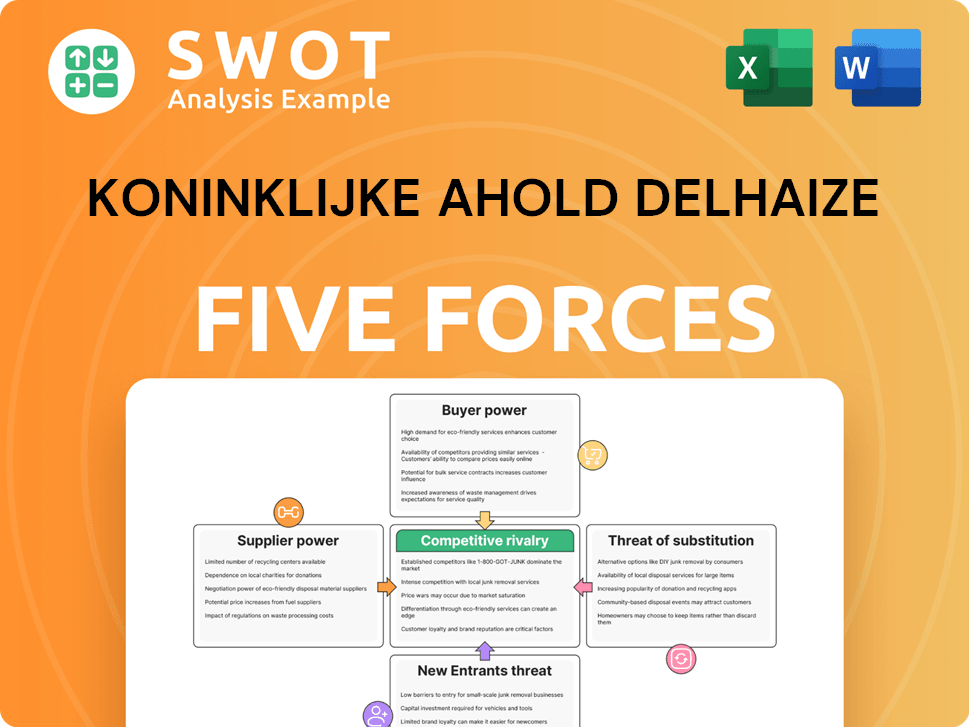
Related Blogs
- What are Mission Vision & Core Values of Koninklijke Ahold Delhaize Company?
- What is Competitive Landscape of Koninklijke Ahold Delhaize Company?
- What is Growth Strategy and Future Prospects of Koninklijke Ahold Delhaize Company?
- How Does Koninklijke Ahold Delhaize Company Work?
- What is Sales and Marketing Strategy of Koninklijke Ahold Delhaize Company?
- What is Brief History of Koninklijke Ahold Delhaize Company?
- What is Customer Demographics and Target Market of Koninklijke Ahold Delhaize Company?
Disclaimer
All information, articles, and product details provided on this website are for general informational and educational purposes only. We do not claim any ownership over, nor do we intend to infringe upon, any trademarks, copyrights, logos, brand names, or other intellectual property mentioned or depicted on this site. Such intellectual property remains the property of its respective owners, and any references here are made solely for identification or informational purposes, without implying any affiliation, endorsement, or partnership.
We make no representations or warranties, express or implied, regarding the accuracy, completeness, or suitability of any content or products presented. Nothing on this website should be construed as legal, tax, investment, financial, medical, or other professional advice. In addition, no part of this site—including articles or product references—constitutes a solicitation, recommendation, endorsement, advertisement, or offer to buy or sell any securities, franchises, or other financial instruments, particularly in jurisdictions where such activity would be unlawful.
All content is of a general nature and may not address the specific circumstances of any individual or entity. It is not a substitute for professional advice or services. Any actions you take based on the information provided here are strictly at your own risk. You accept full responsibility for any decisions or outcomes arising from your use of this website and agree to release us from any liability in connection with your use of, or reliance upon, the content or products found herein.